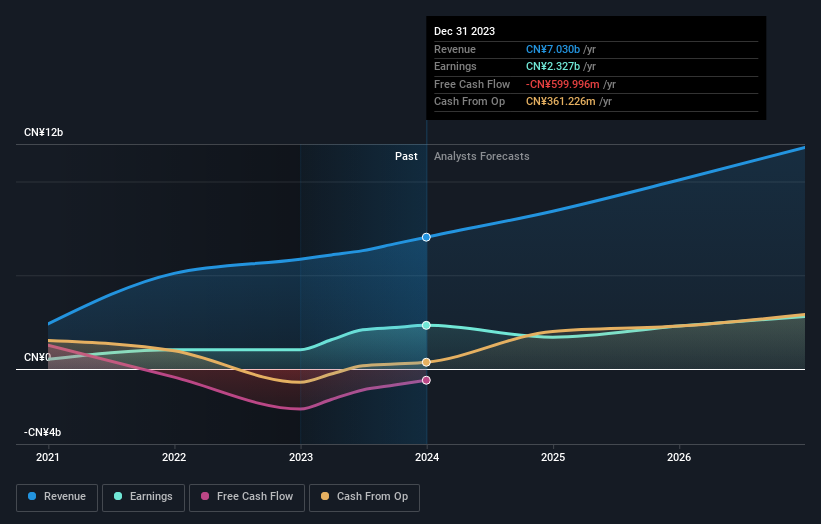Insiders have been selling ZJLD Group Inc (HKG:6979) recently yet still hold a significant stake; 3.5% drop last week not ideal

Key Insights
- Significant insider control over ZJLD Group implies vested interests in company growth
- The largest shareholder of the company is Xiangdong Wu with a 67% stake
- Insiders have been selling lately
If you want to know who really controls ZJLD Group Inc (HKG:6979), then you'll have to look at the makeup of its share registry. We can see that individual insiders own the lion's share in the company with 68% ownership. Put another way, the group faces the maximum upside potential (or downside risk).
Despite selling some shares recently, insiders control a good portion of the company's stock. Following last week's 3.5% decline in share price, the group also suffered the most losses.
In the chart below, we zoom in on the different ownership groups of ZJLD Group.
See our latest analysis for ZJLD Group

What Does The Institutional Ownership Tell Us About ZJLD Group?
Many institutions measure their performance against an index that approximates the local market. So they usually pay more attention to companies that are included in major indices.
Institutions have a very small stake in ZJLD Group. That indicates that the company is on the radar of some funds, but it isn't particularly popular with professional investors at the moment. So if the company itself can improve over time, we may well see more institutional buyers in the future. We sometimes see a rising share price when a few big institutions want to buy a certain stock at the same time. The history of earnings and revenue, which you can see below, could be helpful in considering if more institutional investors will want the stock. Of course, there are plenty of other factors to consider, too.

Hedge funds don't have many shares in ZJLD Group. Our data suggests that Xiangdong Wu, who is also the company's Top Key Executive, holds the most number of shares at 67%. When an insider holds a sizeable amount of a company's stock, investors consider it as a positive sign because it suggests that insiders are willing to have their wealth tied up in the future of the company. For context, the second largest shareholder holds about 13% of the shares outstanding, followed by an ownership of 1.8% by the third-largest shareholder. Interestingly, the third-largest shareholder, Kwong Chue Ng is also a Member of the Board of Directors, again, indicating strong insider ownership amongst the company's top shareholders.
Researching institutional ownership is a good way to gauge and filter a stock's expected performance. The same can be achieved by studying analyst sentiments. There are a reasonable number of analysts covering the stock, so it might be useful to find out their aggregate view on the future.
Insider Ownership Of ZJLD Group
The definition of company insiders can be subjective and does vary between jurisdictions. Our data reflects individual insiders, capturing board members at the very least. The company management answer to the board and the latter should represent the interests of shareholders. Notably, sometimes top-level managers are on the board themselves.
Insider ownership is positive when it signals leadership are thinking like the true owners of the company. However, high insider ownership can also give immense power to a small group within the company. This can be negative in some circumstances.
Our information suggests that insiders own more than half of ZJLD Group Inc. This gives them effective control of the company. Given it has a market cap of HK$36b, that means insiders have a whopping HK$24b worth of shares in their own names. Most would argue this is a positive, showing strong alignment with shareholders. You can click here to see if they have been selling down their stake.
General Public Ownership
With a 15% ownership, the general public, mostly comprising of individual investors, have some degree of sway over ZJLD Group. This size of ownership, while considerable, may not be enough to change company policy if the decision is not in sync with other large shareholders.
Private Equity Ownership
With a stake of 13%, private equity firms could influence the ZJLD Group board. Some investors might be encouraged by this, since private equity are sometimes able to encourage strategies that help the market see the value in the company. Alternatively, those holders might be exiting the investment after taking it public.
Next Steps:
It's always worth thinking about the different groups who own shares in a company. But to understand ZJLD Group better, we need to consider many other factors. To that end, you should learn about the 3 warning signs we've spotted with ZJLD Group (including 1 which is concerning) .
If you would prefer discover what analysts are predicting in terms of future growth, do not miss this free report on analyst forecasts.
NB: Figures in this article are calculated using data from the last twelve months, which refer to the 12-month period ending on the last date of the month the financial statement is dated. This may not be consistent with full year annual report figures.
Valuation is complex, but we're here to simplify it.
Discover if ZJLD Group might be undervalued or overvalued with our detailed analysis, featuring fair value estimates, potential risks, dividends, insider trades, and its financial condition.
Access Free AnalysisHave feedback on this article? Concerned about the content? Get in touch with us directly. Alternatively, email editorial-team (at) simplywallst.com.
This article by Simply Wall St is general in nature. We provide commentary based on historical data and analyst forecasts only using an unbiased methodology and our articles are not intended to be financial advice. It does not constitute a recommendation to buy or sell any stock, and does not take account of your objectives, or your financial situation. We aim to bring you long-term focused analysis driven by fundamental data. Note that our analysis may not factor in the latest price-sensitive company announcements or qualitative material. Simply Wall St has no position in any stocks mentioned.
About SEHK:6979
ZJLD Group
Engages in the production and sale of baijiu products in China.
Very undervalued with excellent balance sheet.


